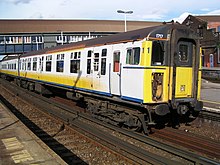British Rail Class 424
| British Rail Class 424 | |
|---|---|
 Class 424 vehicle on display at London Victoria in 1998 | |
| In service | 1997 |
| Manufacturer | Holgate Road carriage works Adtranz (reconstruction) |
| Constructed | 1965 1997 (reconstruction) |
| Number built | 1 vehicle |
| Number scrapped | 1 vehicle |
| Capacity | 77 |
| Operators | Adtranz (technology demonstrator) |
| Specifications | |
| Maximum speed | 100 mph (161 km/h) |
The British Rail Class 424 "Networker Classic" was a prototype electric multiple unit (EMU) built in 1997 by Adtranz at Derby Litchurch Lane Works from a Class 421 driving trailer vehicle.
Project
This article needs additional citations for verification. (October 2023) |

The "Networker Classic" concept involved rebuilding Mark 1 design Southern Region EMUs of Classes 411, 421 and 423 to meet current crashworthiness standards and have electric sliding doors instead of slam doors. This involved building a new bodyshell on the existing chassis, but keeping the original electrical and motor equipment. Therefore, the aim was to produce a 'new' unit at one quarter the cost of manufacturing a train from scratch. The rebuilt units would have had a life of at least fifteen years, thus saving considerable amounts of money when replacing old stock. The unit is known for its similar looks with the British Rail Class 170 and the British Rail Class 357, albeit using pocket doors more similar to the class subsequent classes 376 and 378, and unlike said trains used pocket doors for the driver cab doors, like those of the 1972 design and earlier Mark 3-derived units.
Prototype
One vehicle, no. 76112 from 'Phase 1' 4Cig unit 1749 was rebuilt as a prototype in 1997. This saw the original Mark 1 bodyshell removed from the chassis at Doncaster Works, and replaced with a new one at Derby Litchurch Lane Works resembling a then brand new Turbostar train installed.[1][2] The controls from the 4Cig unit were retained in the driving cab.[citation needed] It was displayed to the public at London Victoria, paired with unrebuilt DT 76747 from 4Big unit 2256 for comparison purposes.[3] The converted vehicle had a total capacity of 77 passengers in Standard Class only; had the full 4-car unit undergone the same conversion, then it would have had capacity for up to 310 passengers.[4]
The prototype unit had not carried passengers throughout its life, as the electric controls were unsuitable for the Class 424.[citation needed]
Although Connex South Central had at one stage proposed ordering some, the train companies turned to new-build rolling stock, which saw the introduction of the Electrostar, Desiro and Juniper families.[5] As a result, the single Class 424 vehicle was stored at Derby Litchurch Lane Works until 2012, when it was removed for disposal.[6] The unrebuilt 4Cig trailer (unit 1399), which paired with the vehicle, was scrapped from the East Kent Railway after attempts of restoration failed.[7]
Fleet Details
| Class | Operator | No. Built | Year Built | Cars per Set |
|---|---|---|---|---|
| Class 424 | ADtranz | 1 | 1997 | 1 |
References
- ^ "Adtranz launches new Networker Classic rebuild at Wembley show". Rail Magazine. No. 318. 19 November 1997. p. 6.
- ^ "Enter the Adtranz Classic". The Railway Magazine. No. 1161. January 1998. p. 45.
- ^ "Adranz Classic takes to the rails". The Railway Magazine. No. 1165. May 1998. p. 60.
- ^ "Experimental Class 424, "Adtranz Classic"". Southern Railway E-Group. 3 December 2002. Retrieved 9 May 2019.
- ^ "Connex will order 497 vehicles in OPRAF deal for longer franchise". Rail Magazine. No. 330. 6 May 1998. p. 7.
- ^ Pritchard, Robert (2012). "325 sent for scrap". Today's Railways. No. 125. Platform 5. p. 69.
- ^ "BR 76747 Driving Trailer Composite 4-CIG EMU built 1970". Archived from the original on 9 April 2014.
External links
- Experimental Class 424, "Adtranz Classic" - Southern Electric Group
- Railway Centre Technical Data[usurped]
- Photograph at Derby Litchurch Lane Works in August 2011
